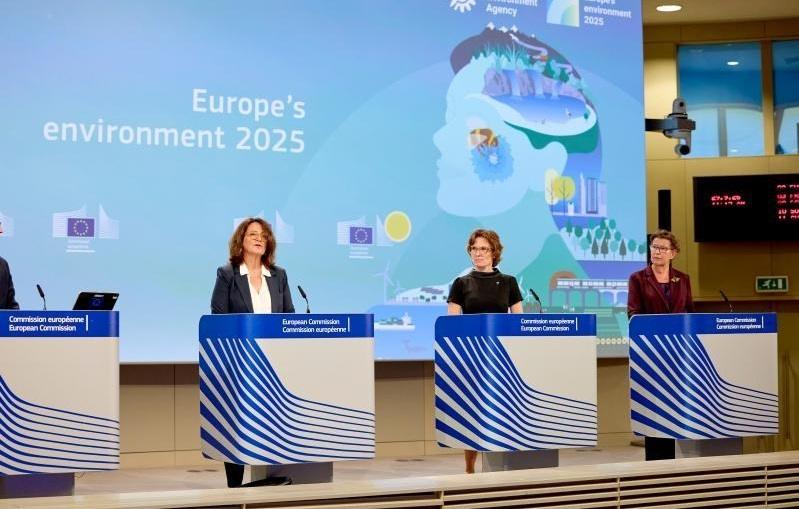The EU has made significant progress towards meeting its climate goals, including reducing greenhouse gas emissions by well over a third since 1990, despite economic growth, but continues to face growing risks to its competitiveness from climate change and environmental degradation, according to a new report by the European Environment Agency (EEA).
The new publication forms part of a series of five-yearly State of Europe’s environment reports released by the EEA as mandated by the European Commission, to provide a broad assessment of the environment, climate and sustainability in Europe.
The EU adopted a Climate Law in 2021, setting into legislation a goal to reach climate neutrality by 2050. In addition to the 2050 goal, the law also set a binding EU climate goal to reduce net GHG by at least 55% by 2030 compared to 1990. More recently, the EU has committed to set a new 2035 GHG emissions reduction goal to reduce greenhouse gas emissions by between 66.25% to 72.5%, and the European Commission has proposed a new target, currently being debated by lawmakers, to reduce emissions by 90% by 2040.
The new report indicated strong progress towards the EU’s interim climate goal, with GHG emissions falling by 37% since 1990, despite 60% GDP growth over the same period, and with the pace of annual emissions reductions in the EU doubling since 2005.
The report cites significant shifts in the energy mix in Europe as a key source of the EU’s emission reduction progress, with the share of renewable energy sources doubling since 2005, and almost a quarter of final energy use in 2023 coming from renewable sources, 45% of all electricity used in the EU now generated by renewables, while fossil fuel use, and coal in particular, has declined.
Despite the energy transition progress, however, the report noted that roughly three-quarters of all EU GHG emissions come from burning fossil fuels for energy, and that that fossil fuels remain the dominant source of energy in Europe at almost 70% of EU gross available energy use in 2023, signaling a need for further investment to accelerate the deployment of renewables, and to drive large-scale electrification and switch industrial processes to cleaner fuels to substitute fossil fuel-based materials with renewable materials.
The report also indicated uneven progress by sector on GHG emissions reduction, finding that while energy supply emissions have declined by 49% since 2005, and industry emissions by 36%, domestic transport emissions have only come down by 6%, and agriculture sector emissions by 7%. While domestic transport emissions reductions are anticipated to accelerate over the next few years, agriculture emissions are expected to remain nearly flat through 2030, according to the report.
Despite the progress in reducing emissions, the report found that the EU faces significant and growing economic risks from climate change, noting that weather and climate-related events caused more than €738 billion in losses from 1980 to 2023, including over €162 billion in the last three years. The report cited estimates that climate impacts could cut EU GDP by 7% by the end of the century, with estimated losses of €2.4 trillion from 2031 to 2050 if warming surpasses 1.5°C, and highlighting high-exposure sectors such as agriculture, forestry, mining and quarrying, and construction.
The report also indicated that progress is lagging in some areas, including finding that the state of biodiversity in Europe is declining, with 81% of habitats in a poor or bad state, and describing the near-term future outlook for biodiversity as “bleak,” with previous targets for ecosystems not being met, and pressures on ecosystems remaining high.
Executive Vice-President for Clean, Just and Competitive Transition, Teresa Ribera, said:
“This report is a stark reminder that Europe must stay the course and even accelerate our climate and environmental ambitions. Recent extreme weather events show how fragile our prosperity and security become when nature is degraded, and climate impacts intensify. Delaying or postponing our climate targets would only increase costs, deepen inequalities, and weaken our resilience. Protecting nature is not a cost. It is an investment in competitiveness, resilience and the well-being of our citizens. By scaling up action now, we can build a cleaner, fairer and more resilient Europe for future generations.”
Click here to access the report.

